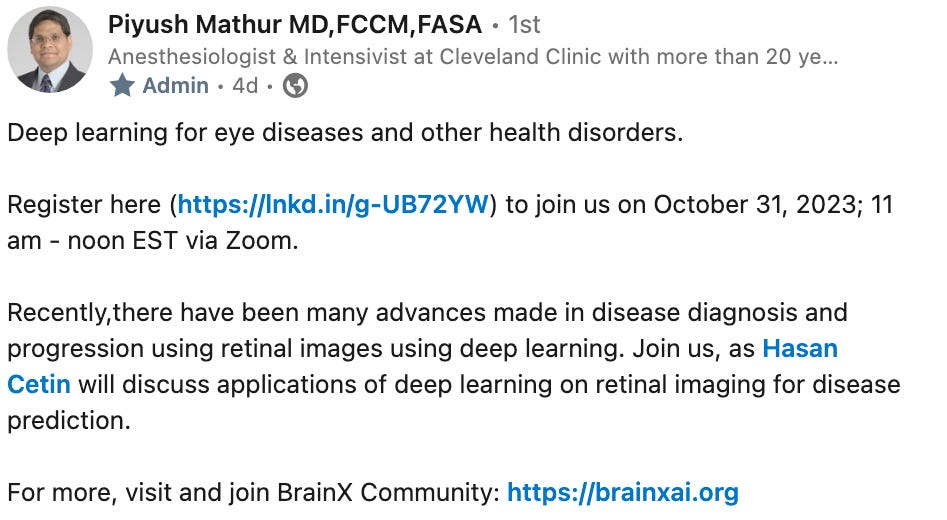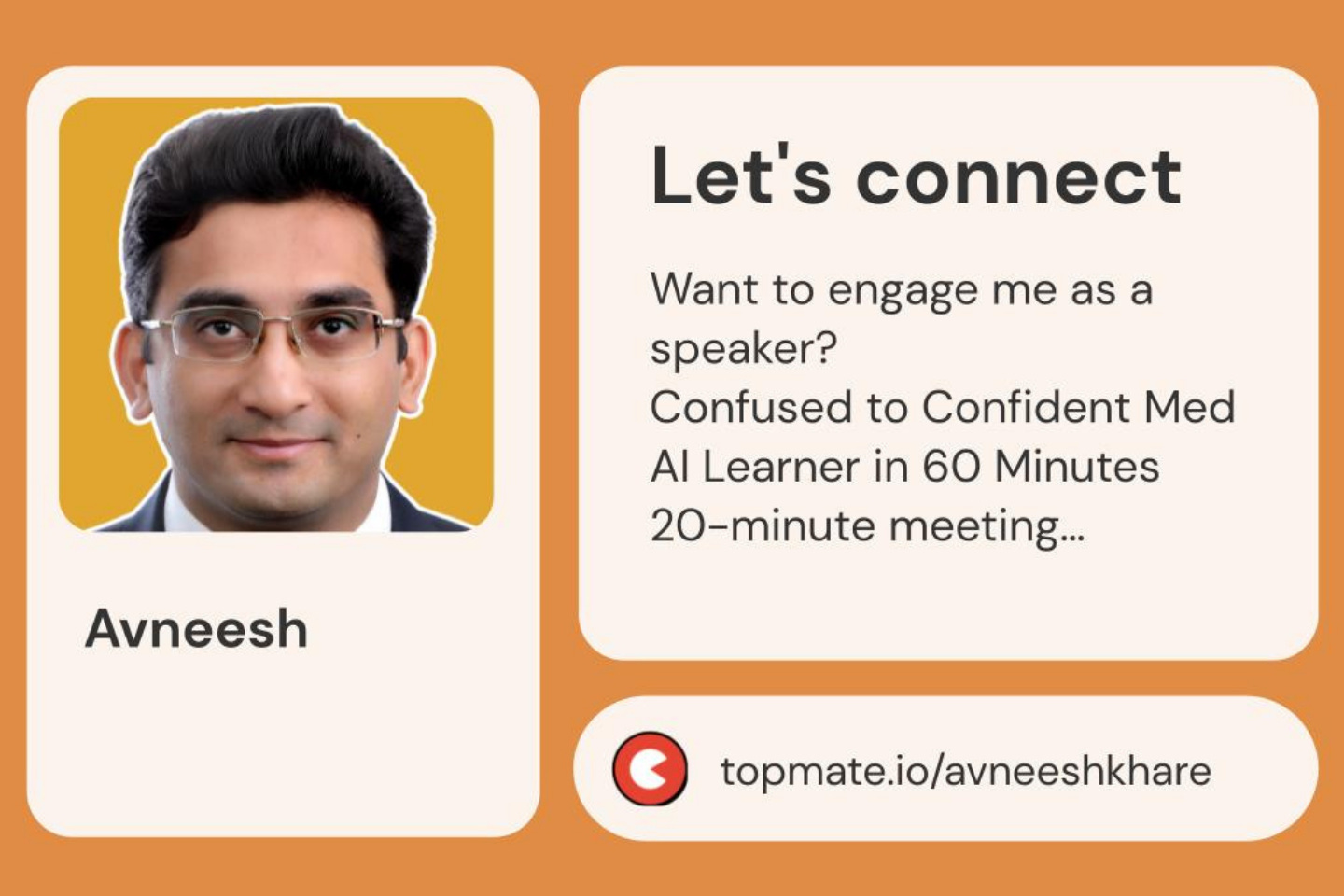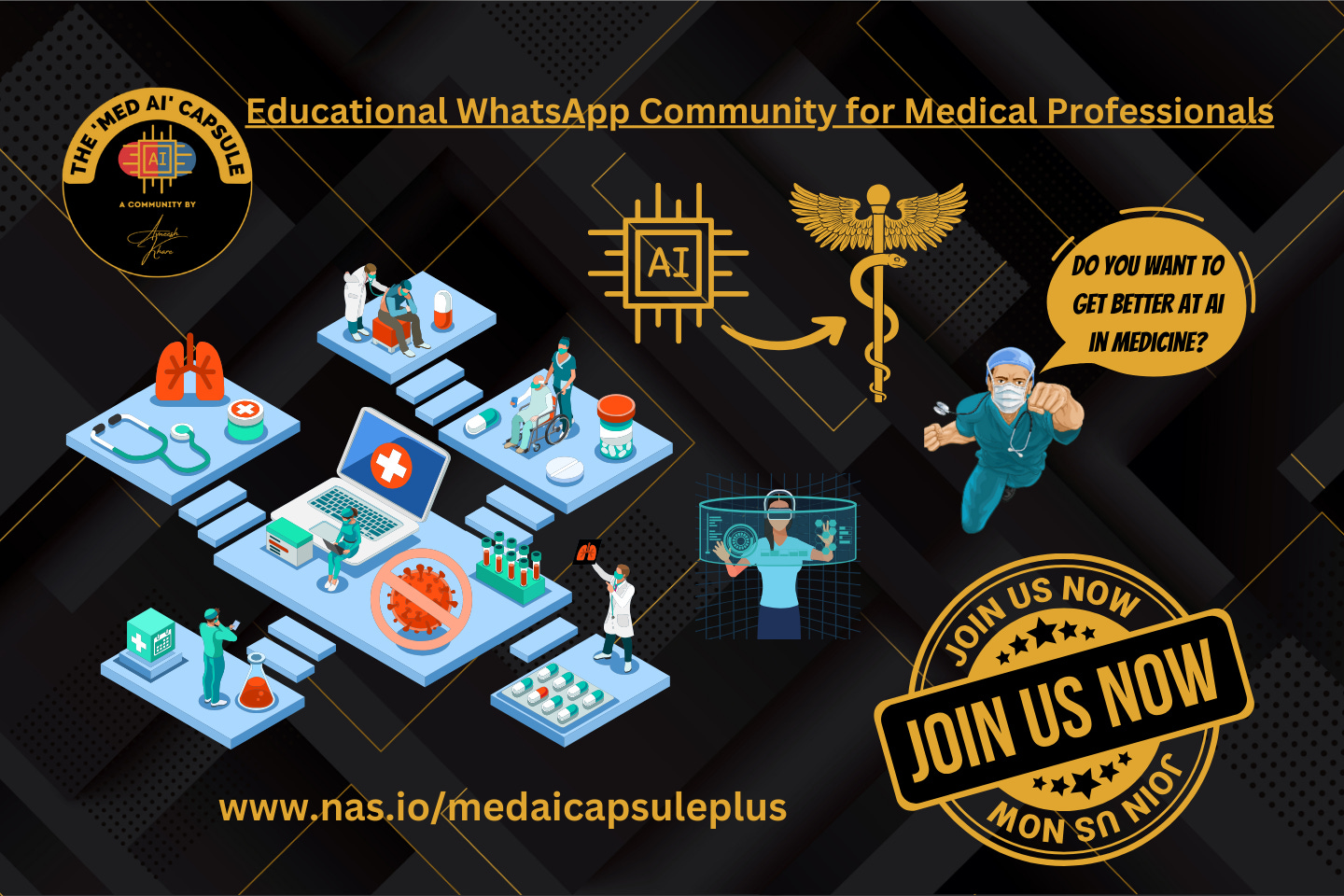🏥 AI Advances Medicine - Cares for Doctors, Detects Cancer Early, Predicts Heart Issues, and More 📊
Weekly Updates on AI in Medicine 🤖🩺🚀
“It is difficult to think of a major industry that AI will not transform. This includes healthcare, education, transportation, retail, communications, and agriculture. There are surprisingly clear paths for AI to make a big difference in all of these industries.” - Andrew Ng
Dear Med AI Enthusiast,
Welcome to The ‘Med AI’ Capsule weekly newsletter, your inside look at how AI is transforming medicine.⚕️🤖💊
In this fast-paced field of artificial intelligence in medicine, I'll be your guide to the most groundbreaking news updates and thought-provoking ideas.
Whether you're a medical pro, tech enthusiast, or curious mind, The ‘Med AI’ Capsule delivers an insider's perspective on the exciting possibilities and cautionary areas for AI in medicine.
Let the adventure begin! I'm thrilled to have you along for the ride. 🚀
In today’s capsule:
3 News Updates
2 Research Updates
1 Upcoming Event, and more…
Reading Time: 5 minutes
Med AI News Updates 📰
1. 🎤 AI shows promise for identifying mental health issues in hospital staff

Why Important: This AI tool analyzed therapy transcripts and was able to identify signs of anxiety, burnout, and depression in hospital staff during the pandemic. Shows promise for using natural language processing to screen mental health.
"Our findings show that those working on the hospital floor during the most intense moment of the pandemic faced unique challenges on top of their regular job-related stressors which put them at high risk for serious mental health concerns."- Matteo Malgaroli, a research assistant professor in the Department of Psychiatry at NYU Langone Health
Caution: The study was limited to one hospital's transcripts. More research is needed to validate accuracy across diverse healthcare settings and distinguish between temporary and chronic conditions. Expanding access to support along with screening will be key.
2. 🤖 AI analysis of mammograms demonstrates potential for earlier breast cancer detection

Why Important: An AI system retrospectively analyzed mammogram data and identified signs of breast cancer up to 2 years pre-diagnosis in over one-third of cases. Indicates potential for earlier detection.
“We were surprised about the results, which means that a substantial portion of the cancers can be detected even earlier as [of] today, resulting in less aggressive treatment, and thus fewer side [effects] and late effects of treatment, [leading to] better quality of life.” - Solveig Hofvind, head of the Norwegian Breast Cancer Screening Program
Caution: Prospective studies are needed to validate the findings. Could incorrectly flag benign lesions. Should complement radiologists.
3. 💻 Facial analysis AI shows accuracy in detecting patient pain levels

Why Important: An automated AI system analyzed facial images to detect pain in patients before, during and after surgery. Aligned with standard pain scales 88-66% of the time and identified subtle cues missed by humans.
"Our proof-of-concept AI model could help improve patient care through real-time, unbiased pain detection." - Timothy Heintz, lead author of the study and a fourth-year medical student at the University of California San Diego.
Caution: Privacy and ethical concerns need addressing before clinical use. More research needed to validate system across diverse patients and care settings.
Med AI Research Updates 🔬
1. 🤖 Deep Learning Predicts Atrial Fibrillation from ECGs

Key Findings: A deep learning model using outpatient ECGs in sinus rhythm accurately predicted the occurrence of atrial fibrillation (AF) within 31 days. The model performed well across diverse patient populations, including various demographic and comorbidity subgroups.
Conclusion: Deep learning applied to ECGs holds promise for identifying individuals at high risk of AF, enabling timely interventions to prevent adverse cardiac events.
2. 🤖 AI-Driven Emotional Assessment for Pediatric Mental Health

Key Findings: AI models can accurately detect emotions in pediatric patients' speech, with a precision of up to 86% and a recall of up to 83%.
Conclusion: AI-based emotion detection can assist pediatricians and mental health providers in triaging youth for appropriate mental health care.
Limitations: Data quality, sample representativeness, limited happiness samples, and legal considerations may impact the study's findings.
Upcoming Med AI Event 🧑💻
Med AI Industry Showcase 📢
Glass Health - AI-powered platform for clinical decision support. Designed to empower clinicians with AI tools for developing differential diagnoses and drafting clinical plans.
Tricog - Real-time remote heart monitoring using AI-powered devices, with its flagship product, InstaECG providing certified ECG reports in 10 minutes while coordinating with hospitals in case of serious issues.
Carpl.ai - AI-powered platforms for radiology. They have a universal platform that accelerates radiology AI adoption and enables at-scale AI deployment. Their D.E.V.-D. framework helps in discovering, exploring, validating, and deploying radiology AI.
Let’s wrap it up with a fun fact!
AI's capacity for rapid learning is astounding. In 2013, AI exhibited intelligence equivalent to that of a 4-year-old human. Experts predict that by 2029, AI will reach the intelligence level of adult humans, raising profound questions about our coexistence with intelligent machines. (source)
Stay tuned for our upcoming editions as we explore the latest breakthroughs and dive deep into AI's transformative power, shaping a healthier future.
Warm regards,
P.S.: If you're a medical professional intrigued by artificial intelligence, but not sure where to start, feel free to reach out to me for personalised guidance.
You can also check out and join our vibrant Med AI WhatsApp Community for Medical Professionals.






